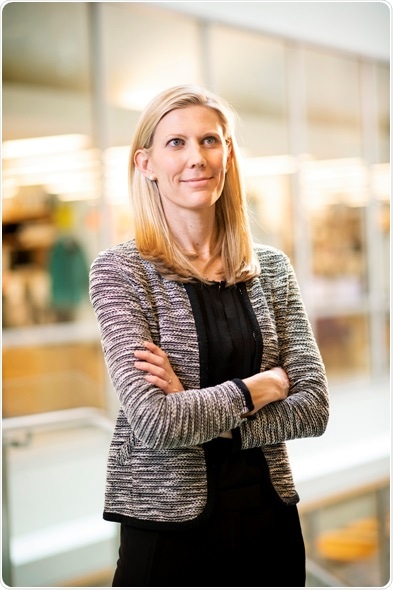Mar 5 2019
As Age-Related Macular Degeneration/Low Vision Awareness Month comes to a close, we’re sharing three stories by Bonnielin Swenor, Ph.D., M.P.H., assistant professor of ophthalmology at the Wilmer Eye Institute in the Johns Hopkins University School of Medicine, and an assistant professor of epidemiology at the Johns Hopkins Bloomberg School of Public Health. Swenor brings her unique perspective as a person living with low vision to her work as a researcher studying how visual impairment affects older adults, and how to ensure that more people receive the vision care services they need.

Bonnielin Swenor, Ph.D., M.P.H. Credit: Johns Hopkins Medicine
Losing Vision Makes Swenor Better at Her Work
Disability affects every part of life. Everyday aspects of life can be harder. But that also drives all my research.”
Bonnielin Swenor, Ph.D., M.P.H., Assistant Professor of ophthalmology, Wilmer Eye Institute in the Johns Hopkins University School of Medicine, and Assistant Professor of epidemiology, Johns Hopkins Bloomberg School of Public Health
Swenor was diagnosed with myopic macular degeneration when she was 26. The condition damaged her central vision. This makes it harder to perform tasks such as reading, driving or seeing a person’s face. She was at first afraid her disability would end her career, but after years of struggling and learning, she now uses her unique perspective to advance research surrounding low vision.
To guide and encourage people with similar struggles, Swenor shared her story in the Feb. 5 issue of JAMA.
Regarding the difficulty she encountered as a person with a disability, Swenor believes that academic institutions need to better include scientists and clinicians with disabilities. This can be accomplished through various ways, including creating centralized cost centers at each institution to help pay for disability accommodations.
“I see myself more as a patient than a researcher, representing people like me, and that’s a privilege I take seriously,” says Swenor. “In all situations—coming up with research ideas, asking questions in meetings and reviewing manuscripts—I get to offer a perspective as a patient.”
Older Adults with Visual Impairment are at Increased Risk of Cognitive Decline
People usually think cognitive decline, such as memory loss or confusion, are normal parts of aging, and they might not take it seriously. But experiencing cognitive loss makes living as an older adult harder. Swenor and her co-authors wanted to see whether losing eyesight might contribute to cognitive problems. The results of their studies show that over time, older adults with visual impairments such as difficulty seeing things despite wearing eyeglasses had greater declines in cognition, are at greater risk of cognitive impairment and are more likely to report memory complaints than those without visual impairments.
The study findings suggest that vision loss may be an important factor affecting cognition, meaning that vision and eye health are important to maintaining a healthy brain while aging.
Swenor and her team have two related studies on this. The first study, published Oct. 25 in The Journals of Gerontology—Series A, used data from the Health, Aging and Body Composition Study. The second study, published Jan. 8 in Gerontology and Geriatric Medicine, used data from 1999–2006 cycles of the National Health and Nutrition Examination Survey.
Women, Minorities and People with Visual Impairment Less Likely to Afford Eyeglasses
Swenor and her team wanted to determine whether economic recovery from the 2008 recession and changes in health care laws were reflected in whether people sought out eye care. In this study, they found a trend of eyeglasses becoming more affordable in the U.S., however, some vulnerable populations aren’t benefiting from this trend. Swenor and her team are not investigating disparities in eyeglass affordability.
The results show that women, racial minorities and people with vision impairment are more likely to use eye care services, but less likely to be able to afford eyeglasses when needed. It is not known why these vulnerable populations aren’t benefiting, and researchers plan to look at this in future studies.
Not getting needed eye care can affect the ability to live and work independently and can lead to other health problems. Swenor’s study suggests that efforts are needed to make eye care more affordable to the most vulnerable populations.